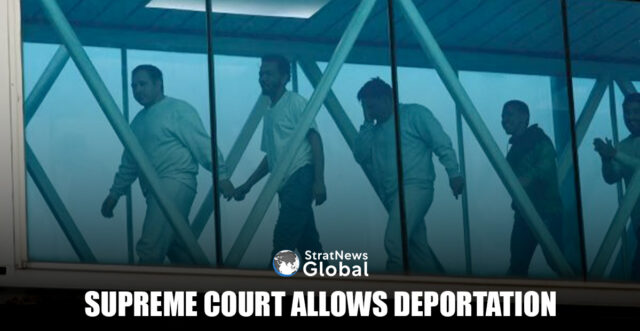On Monday, the U.S. Supreme Court authorized President Donald Trump’s administration to restart deporting migrants to nations other than their country of origin, without requiring officials to give them an opportunity to demonstrate potential risks they might face. The decision marks another win for Trump’s hardline deportation policy.
In an action that prompted a sharp dissent from its three liberal justices, the court granted the administration’s request to lift a judicial order requiring that migrants set for deportation to so-called “third countries” get a “meaningful opportunity” to tell U.S. officials they are at risk of torture at their new destination, while a legal challenge plays out.
Boston-based U.S. District Judge Brian Murphy had issued the order on April 18.
The Supreme Court’s brief order was unsigned and offered no reasoning, as is common when it decides emergency requests. The court has a 6-3 conservative majority.
Justice Sonia Sotomayor, joined by the two other liberal justices, called the decision a “gross abuse” of the court’s power.
“Apparently, the court finds the idea that thousands will suffer violence in far-flung locales more palatable than the remote possibility that a district court exceeded its remedial powers when it ordered the government to provide notice and process to which the plaintiffs are constitutionally and statutorily entitled,” Sotomayor wrote.
Sotomayor called the court’s action “as incomprehensible as it is inexcusable.”
Murphy had found that the administration’s policy of “executing third-country removals without providing notice and a meaningful opportunity to present fear-based claims” likely violates the U.S. Constitution’s due process protections. Due process generally requires the government to provide notice and an opportunity for a hearing before taking certain adverse actions.
Deportations To Third Countries
After the Department of Homeland Security moved in February to step up rapid deportations to third countries, immigrant rights groups filed a class action lawsuit on behalf of a group of migrants seeking to prevent their removal to such places without notice and to gain chance to assert the harms they could face.
Murphy on May 21 found the Trump administration violated his order requiring additional steps before attempting to send a group of migrants to politically unstable South Sudan, which the U.S. State Department has urged Americans to avoid “due to crime, kidnapping and armed conflict.”
The judge’s intervention prompted the U.S. government to keep the migrants at a military base in Djibouti.
After the U.S. Supreme Court ruling, Murphy in a court order made clear that his decision preventing the rapid deportation of eight men to South Sudan “remains in full force and effect.”
Trina Realmuto, executive director of the National Immigration Litigation Alliance, which helps represent the plaintiffs, called the ramifications of the court’s action “horrifying,” stripping away “critical due process protections that have been protecting our class members from torture and death.”
The administration told the Supreme Court that its third-country policy already complied with due process and is critical for removing migrants who commit crimes because their countries of origin are often unwilling to take them back. It said that all the South Sudan-destined migrants had committed “heinous crimes” in the United States including murder, arson and armed robbery.
“The Supreme Court’s stay of a left-wing district judge’s injunction reaffirms the president’s authority to remove criminal illegal aliens from our country and Make America Safe Again,” White House spokesperson Abigail Jackson said after Monday’s decision.
“Fire up the deportation planes,” said Department of Homeland Security Assistant Secretary Tricia McLaughlin.
A Flood Of Cases
The dispute is one of many legal challenges to Trump policies to have reached the nation’s highest judicial body since he returned to office in January.
The Supreme Court in May let Trump end humanitarian programs for hundreds of thousands of migrants to live and work in the United States temporarily. The justices, however, faulted the administration’s treatment of some migrants whom Trump targeted for removal under the Alien Enemies Act – a 1798 law that historically has been employed only in wartime – as inadequate under constitutional due process protections.
Sotomayor said that in sending migrants to South Sudan, and in another instance four others to the U.S. naval base at Guantanamo Bay, Cuba, and on to El Salvador, the administration “openly flouted two court orders” issued by Murphy. Sotomayor also pointed to the separate Alien Enemies Act litigation in which questions were raised about the administration’s compliance with an order issued by a judge in that case.
“This is not the first time the court closes its eyes to noncompliance, nor, I fear, will it be the last,” Sotomayor wrote. “Yet each time this court rewards noncompliance with discretionary relief, it further erodes respect for courts and for the rule of law.”
The administration asked the Supreme Court to intervene after the Boston-based 1st U.S. Circuit Court of Appeals on May 16 declined to put Murphy’s decision on hold.
According to reports, U.S. officials had been considering sending migrants to Libya, another politically unstable country, despite previous U.S. condemnation of Libya’s harsh treatment of detainees.
(With inputs from Reuters)





